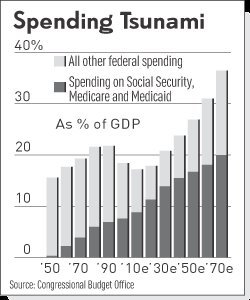Posted 3/7/2006
Government Spending: Is a line-item veto better than nothing? Probably. Is it enough to bring spending under control? Not by a long shot. The entitlement train is barreling along, and this won't slow it down.
With all due respect, it's hard to repress a chuckle when thinking about President Bush, Congress and their not-so-new idea for cutting government waste. Unveiled Tuesday by Bush, with statements of support from Republican leaders in the House and Senate, it's an updated version of that Washington perennial, the line-item veto.
No one, either friend or foe of Bush, can miss the irony in his request. He wants to be able to send specific items within bills back to Congress for reconsideration (calling it a "veto" may be too strong), but, of course, he already has the power to veto entire bills outright. And so far, he's not seen fit to do so. He's unusual in this respect. Only two presidents, James Monroe and Thomas Jefferson, went longer than Bush before vetoing a bill, and Bush will pass Monroe on March 20.
Congress has been every bit as guilty as the president. After all, it sends him the pork-stuffed legislation. So when its leaders second Bush's call for a rebirth of fiscal discipline, neither they nor the president can expect the public to take them seriously.
We're not saying the line-item veto would hurt. It might even help a little. It's just not what the country really needs, and Congress could eventually find ways to work around it.
In theory, forcing lawmakers to vote again on a special-interest item buried in a huge spending bill might embarrass them into reversing themselves.
But they could find new ways to bury the pork, as they did with the infamous "bridge to nowhere," a $320 million item inserted in last year's highway bill for a bridge from Ketchikan, Alaska, to its island airport. Under fire, Congress struck this line item, but ended up giving Alaska the money in general transportation funds.
There's also plenty to worry about beyond pork. In fact, the threat of runaway discretionary spending (over which Congress has year-to-year control) will soon pale in comparison to the growth on the mandatory side. This is the spending locked into law and expanding on autopilot, driven by demographics. Left unreformed, it ultimately will swallow up so much of the budget that precious little will be left for defense, not to mention bridges in the boondocks.
According to an estimate by the Congressional Budget Office, spending on the Big Three entitlements (Social Security, Medicare and Medicaid) will go from 41% of the federal budget in 2000 to 65% in 2040, with overall federal spending rising from 18.4% to 23.8% of GDP. Serious reform of these programs, including cuts in tax-paid benefits, would slow their growth to reasonable levels. But neither Bush nor Congress is talking about such action now.

To his credit, the president tried to get Social Security reform rolling last year, but Democrats did their scare-the-oldsters routine and the GOP ran for the tall grass. This time, Washington may muster the courage to do something about the much smaller problem of pork and earmarks, but it will let another year go by while the entitlement train barrels along, getting harder to stop all the time.
No comments:
Post a Comment